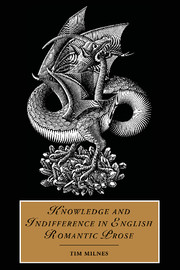Book contents
- Frontmatter
- Contents
- Acknowledgements
- Introduction: Romanticism's knowing ways
- 1 From artistic to epistemic creation: the eighteenth century
- 2 The charm of logic: Wordsworth's prose
- 3 The dry romance: Hazlitt's immanent idealism
- 4 Coleridge and the new foundationalism
- 5 The end of knowledge: Coleridge and theosophy
- Conclusion: life without knowledge
- Notes
- Bibliography
- Index
- CAMBRIDGE STUDIES IN ROMANTICISM
2 - The charm of logic: Wordsworth's prose
Published online by Cambridge University Press: 22 September 2009
- Frontmatter
- Contents
- Acknowledgements
- Introduction: Romanticism's knowing ways
- 1 From artistic to epistemic creation: the eighteenth century
- 2 The charm of logic: Wordsworth's prose
- 3 The dry romance: Hazlitt's immanent idealism
- 4 Coleridge and the new foundationalism
- 5 The end of knowledge: Coleridge and theosophy
- Conclusion: life without knowledge
- Notes
- Bibliography
- Index
- CAMBRIDGE STUDIES IN ROMANTICISM
Summary
A tranquillizing spirit presses now
On my corporeal frame, so wide appears
The vacancy between me and those days,
Which yet have such self-presence in my mind
That sometimes when I think of them I seem
Two consciousnesses – conscious of myself,
And of some other being.
William Wordsworth, The PreludeBy the time Coleridge proclaimed that Wordsworth was capable of producing England's ‘First Genuine Philosophic Poem’, the state of philosophy itself in Britain was at a crossroads, caught between an empiricism sunk in scepticism and a descriptive naturalism which harboured, it seemed, a freedom-denying materialism. As a result, Wordsworth's problems in living up to this accolade are as much to do with the fact that philosophy was beginning a long process of redefining itself as they are to do with the impossible expectations of Coleridge. The Romantic notion of ‘philosophy’ is inherently unstable, oscillating between an Enlightenment foundationalism collapsed by Hume, and some, as yet undefined, new way of knowledge which did not sever value from fact. The responsibility of ‘knowing’, taken as the detached perspective of the neutral spectator, continued to weigh heavily on Wordsworth's brave new poetics of engagement. Thus, as Kenneth Johnston observes, the obstacle facing Wordsworth in his attempts to compose The Recluse ‘is rather too much philosophy than too little, giving rise to expectations that it cannot satisfy’.
- Type
- Chapter
- Information
- Knowledge and Indifference in English Romantic Prose , pp. 71 - 104Publisher: Cambridge University PressPrint publication year: 2003

